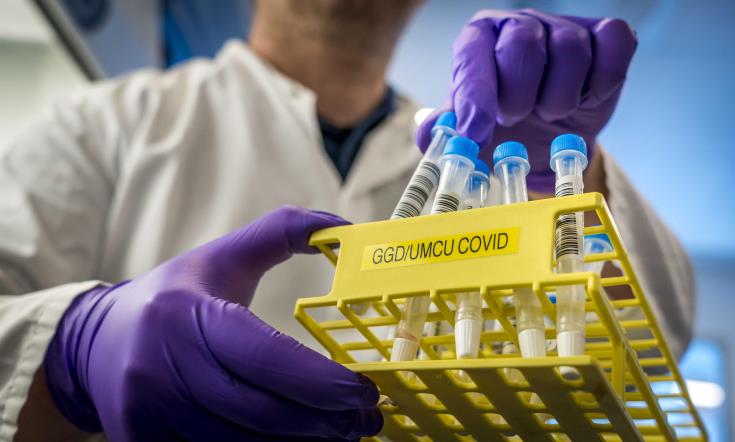Cases of people appearing to be re-infected with the coronavirus and relapse Covid-19, although relatively rare, are becoming more common around the world.
This development worries scientists, as it is an indication that in a minority of people - but not in most - the natural immunity weakens relatively quickly. Indicative and not at all unique, according to "Science", is the case of 22-year-old Dutch nurse Seine de Jong, who was diagnosed with coronavirus on April 17, had mild symptoms for two weeks, then recovered and tested negative in a new test at 2 May, when she returned to work at a Rotterdam hospital. But her symptoms reappeared (shortness of breath, nausea, muscle and abdominal pain, runny nose, anosmia, diarrhea), on July 3 she did a new test and was diagnosed again with coronavirus.
Reports of such incidents are becoming more frequent. The second infection in the same person and even in a short time indicates that in some people their body has not retained enough antibodies to keep the coronavirus SARS-CoV-2 away. Especially for these people, the question arises more urgently how much the vaccines will help them and how long their immunity will last after the vaccination.
"The question everyone wants to answer is whether the second infection will usually be less severe or not, and what can these re-infections teach us about immunity to SARS-CoV-2 in general," said Derek Cummings, an infectious disease specialist at the University. of Florida. It seems, however, as expected, that a second infection is milder than the first, as the latter has created some defensive "mounds", insufficient to prevent re-infection, but usually sufficient to alleviate the symptoms the second time.
Infectious disease specialist Antonio Bertoleti of the National University of Singapore estimates that "most re-infections with the new coronavirus will be asymptomatic" and even considers a recurrent infection positive, "because it continues to strengthen and train the immune system".
The first case of recurrent infection was reported by South Korean scientists in April, but the first confirmed case was in late August and involved a 33-year-old Hong Kong man who was initially diagnosed with coronavirus in March and tested positive again in March. August 15 at Hong Kong Airport, having milder symptoms than in the spring.
Since then, there have been at least 24 other confirmed cases of re-infection, but scientists are confident that the actual number is clearly higher.
When is it officially considered a recurrent infection?
In order for a patient to be officially considered a recurrent infection, he or she must test positive for a second molecular PCR test after a negative test, as well as an asymptomatic period of time. But according to Dutch National Institute of Public Health and Environment (RIVM) virologist Sandal Roisken, things may not always be clear: a second positive test - even if a negative test between the first and second tests - may due to the patient having a non-replicating viral RNA residue from his or her original infection or may have been infected by two different coronavirus strains at the same time (rare but not impossible) or because his body was suppressed but never had not eliminated the coronavirus, so in essence it is not a new infection, but the "meteorites" of the first.
To make things clearer, many scientists want to see two complete "readings" of the coronavirus genome, based on both the first positive and the second positive sample, to make sure it was a different infection rather than a continuation of the first. .
But, according to hematologist Paul Moss of the University of Birmingham in Britain, "this bar is very high. In many cases, the genetic material is simply not available. " Even so, many laboratories do not have the time in the midst of a pandemic to make a comparative genetic study between the first and second samples. Thus, the number of genetically confirmed re-infections is considered to be much lower than the number of suspected cases: for example, the Netherlands has found 50 such suspected cases, Brazil 95, Sweden 150, Mexico 285 and Qatar 243.
In the other four most common cold viruses that cause the common cold, re-infections occur on average after 12 months, according to virologist Lia van der Hook of the University of Amsterdam Medical Center, who estimates that something similar will eventually happen with the new coronavirus, as more and more former patients will lose their natural immunity.
"It is better to prepare for a wave of re-infections in the coming months. "This is bad news for those who still believe in herd immunity through natural infections."
Other scientists are less pessimistic. Recent research by US researchers has concluded that antibodies after natural immunity can persist for at least six months and possibly in several cases for years, if not decades, according to Sean Crotti of the La Jolla Institute of Immunology in California. observed in SARS and MERS.
As well as from coronaviruses, people who became more seriously ill then have stronger physical immunity, while those who became ill "on foot" show fewer antibodies. But not all recurrent infections are milder than the original ones. "We see all the different combinations," Roisken said. Among other things, there is a risk that an incorrect reaction of the immune system during the first infection will lead to a worsening of the second.
Source: RES-EAP
